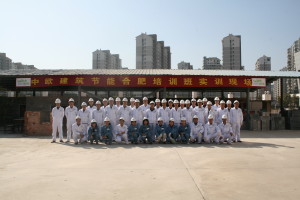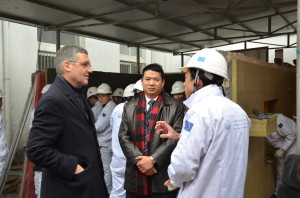The SWITCH-Asia ‘Train the Trainers’ Project (the Project) has made a huge contribution to EU-China cooperation in the field of urbanisation. Led by the European Union Chamber of Commerce the Project came to end on 31st July after four years. Project manager Silvia Sartori looks back at the accomplishments and says that the Project will live on in the form of the Sino-European Energy-Efficient Building and Training Research Centre.
The European Union (EU) grant to run the project was awarded by Directorate General EuropeAid (now Development and Cooperation – EuropeAid), with the aim of promoting energy-efficient buildings (EEBs) among Chinese small- and medium-sized enterprises (SMEs) in the construction sector in Shanghai, Zhejiang, Jiangsu, Jiangxi and Anhui. Running for a total of 54 months, and jointly implemented with Tongji University, Shanghai, and the Swedish Environmental Research Institute (IVL), the Project has been active in three main areas: training, research and engagement with policy-makers.
The flagship activity of the Project has undoubtedly been the training which was based on a combination of theoretical and practical training, giving all participants the opportunity to take what they’d learned in the classroom and apply it themselves. Practical training focussed on insulation of external walls, while theoretical instruction covered a wide range of topics related to EEBs such as indoor comfort, classification and verification of buildings, renewable energy, building techniques and materials, layout and function. Specific content was tailored to each target group in order to address specific needs and match the expertise of a diverse number of participants that included architects and designers, developers, construction companies, materials suppliers, supervisors and government officials at local and national level.
Training modules, a product of collaboration between Chinese and European research partners, combined Europe’s long-standing expertise in EEBs and sustainable urbanisation and placed it in the context of China’s local climate and prevailing regulatory environment. This resulted in a programme that promoted best practices and case studies, integrating the latest know-how from Europe and China, while ensuring that the knowledge gained could be applied specifically to creating solutions for the greater Shanghai region.
A positive by-product of the programme was that the expertise developed through the research that went into designing the training courses, and the subsequent impact that the training had, helped to support dialogue between EU stakeholders and policy-makers at both local and national level. Authorities strongly welcomed the Project’s training model as it addressed a significant need in the industry and also helped to pave the way for a more comprehensive understanding of sustainable urbanisation concepts and practices. In particular, the local construction authorities in Jiaxing (Zhejiang Province) and Jiangsu Province officially endorsed the Project training and certificate respectively.
As testament to the value of the Project, to both European and Chinese sides, its benefits reached beyond its function as a training ground for individuals working in urbanisation-related industries. Knowledge developed through the Project has been used to contribute to the drafting of the Ministry of Housing and Urban-Rural Development’s (MoHURD) standards for green buildings and green building materials. Also, since the project’s inception in 2009 the European Chamber’s annual Position Paper has integrated the recommendations and experiences of the Project, specifically in the papers related to environment, construction and energy.
With more than 2,200 professionals trained by the Project since 2009, and increasing demand from both industry and policy-makers in the field of sustainable urbanisation, ‘Train the Trainers’ has drawn plenty of media attention in industry media, such as China Construction News and Construction Times, and has been promoted as a reliable reference for best practices and a hub of expertise that helps support China’s steps towards sustainable development.
The Project has successfully developed partnerships and created synergies with a wide range of stakeholders that are actively engaged in this field. These include: industry associations (e.g. the Green Building Professional Partnership (GBPP) and ETICS Quality Alliance); international organisations (e.g. the International Labour Organisation (ILO) and the United Nations Environment Programme (UNEP); civil society (e.g. GreenDrinks China); international projects (e.g. the Sustainable Building Interior and Decoration Initiative in China (SUSBIRD)); and media organisations (e.g. ArChina).
The Project created ripples outside of China too. Although focussed on China, the ‘Train the Trainers’ programme included many features that are of relevance to other countries facing similar challenges in energy efficiency, resource management and sustainable urban development. Because of this, SWITCH Asia was invited to contribute to international conferences and forums across Asia and beyond, where it shared information on its working mechanisms, success factors and lessons learned to support regional and international replication.
Despite its formal closure at the end of July 2013, ‘Train the Trainers’ lives on via the new Sino-European
Energy-Efficient Building Training and Research Centre (the Centre) that has been established at Tongji University in Shanghai. Building on the achievements and reputation of the Project, this permanent Centre further carries out activities initiated by the Project with the objective of further expanding its geographical reach, the services it offers, the types of audience it addresses and the content that it delivers.
Vocational schools will benefit from training at the centre, whose content will be expanded from a specific focus on construction to embrace the broader process of sustainable urbanisation. The Centre’s faculty consists of a combination of several departments which all relate to different aspects of urbanisation. Experts in subjects such as environmental sciences, urban planning, transportation and building materials all come together to provide an overarching, holistic approach to sustainable urban development.
While continuing to carry out training and support policy making, the Centre intends to expand its services by engaging in consultancy with industry as well as at a municipal government level.
Having been granted a national licence by the Ministry of Education, the Centre is prepared to operate across China. In May 2013 a new centre was opened in Guiyang, Guizhou Province, adding to the network of provincial branches already established over the first four years of the project in Nanjing in Jiangsu, Hefei in Anhui, Jiaxing in Zhejiang and Nanchang in Jiangxi. These branches will continue to promulgate the mandate of the Project in the respective provinces beyond 2013 while the centre will to continue to expand its reach to new regions throughout China.
The European Chamber remains committed to continuing its contribution to China’s sustainable urban development, and demonstrated this in April 2013 by signing a memorandum of understanding (MoU) with the Centre to support its post-Project phase. The Chamber has also been facilitating the development of public-private partnerships (PPPs) between interested member companies and the Centre. These strategic partnerships ensure a strong European dimension to the development of the Centre and will help it to keep abreast of the latest developments in European expertise within the industry.
Cooperation with the Centre offers European companies a unique opportunity to reach out to one of China’s most renowned universities, expand their China network and helps them to identify common solutions for sustainable urban development applicable to the country.
Following the successful completion of the Project the European Chamber and Tongji University look forward to continuing their relationship of four and half years as they move into a new era of cooperation where European know-how can be further shared with China as it embarks on the biggest migration and urbanisation process in human history.
To date half a dozen European companies and projects have inked an MoU with the Centre, which remains open to engaging with further European counterparts. Interested parties can contact the Centre Director, Professor Zhang Yongming, at zym126@tongji.edu.cn




Recent Comments